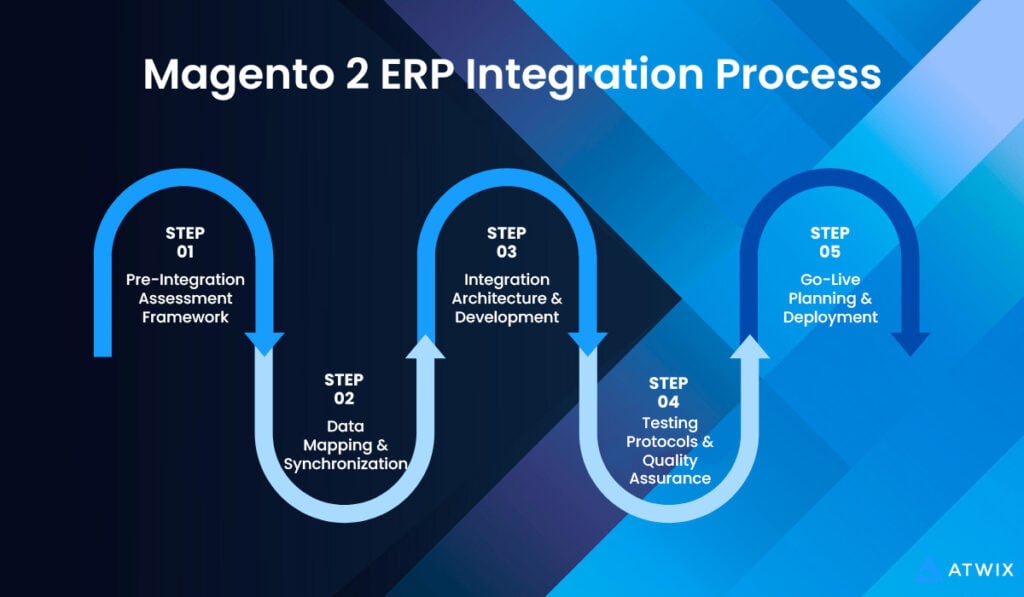Your company has outgrown basic eCommerce functionality, and you need real-time data synchronization between your ERP system and Magento 2 store. Poor integration leads to inventory discrepancies, manual data entry errors, and frustrated customers seeing incorrect product availability. This comprehensive guide provides a proven methodology for planning and executing successful Magento 2 ERP integrations that eliminate data silos and drive operational efficiency.
What You’ll Learn:
- Pre-integration assessment framework to avoid costly mistakes
- Step-by-step integration methodology proven across 200+ implementations
- Data mapping strategies that prevent synchronization failures
- Testing protocols that catch issues before go-live
- Go-live checklist ensuring seamless deployment
ERP Integration Complexity Matrix
The following table outlines the integration complexity, timeline, cost range, and key considerations for connecting the most popular ERP systems with Magento 2 to help guide your decision-making process.
| ERP System | Integration Complexity | Typical Timeline | Cost Range | Key Considerations |
|---|---|---|---|---|
| NetSuite | Medium | 8-12 weeks | $25,000-$45,000 | Strong REST API, extensive customization options |
| SAP | High | 12-20 weeks | $50,000-$100,000 | Complex data structures requiring specialized expertise |
| Infor | Medium-High | 10-16 weeks | $35,000-$65,000 | Legacy system challenges, limited API documentation |
| Microsoft Dynamics 365 | Medium | 8-14 weeks | $30,000-$55,000 | Good integration tools, version compatibility issues |
Timeline and cost estimates based on mid-market implementations with standard customization requirements
Step-by-Step Magento 2 ERP Integration Guide

Step 1: Pre-Integration Assessment Framework
Before writing a single line of code, conduct a comprehensive assessment to identify potential integration challenges and define success metrics.
Business Requirements Analysis
Document your current business processes and identify pain points that integration must solve. Common requirements include:
- Real-time inventory synchronization across multiple warehouses
- Automated order processing from Magento to ERP
- Customer data consistency between systems
- Financial reporting consolidation
Create a requirements matrix, scoring each need by business impact (1-5) and technical complexity (1-5). Focus integration efforts on high-impact, medium-complexity items first.
Technical Architecture Review
Evaluate your current technical infrastructure to identify integration constraints:
Data Flow Assessment:
- Current data volumes and growth projections
- Network bandwidth and latency requirements
- Security protocols and compliance needs
- Backup and disaster recovery procedures
System Compatibility Check:
- ERP version and API capabilities
- Magento 2 edition and custom modules
- Middleware requirements and hosting environment
- Third-party integrations that may be affected
Integration Readiness Checklist
| Assessment Area | Status | Notes |
|---|---|---|
| ERP API documentation complete | ✓/✗ | |
| Data mapping requirements defined | ✓/✗ | |
| Security protocols approved | ✓/✗ | |
| Testing environment configured | ✓/✗ | |
| Rollback procedures documented | ✓/✗ | |
| Stakeholder training plan created | ✓/✗ |
Step 2: Data Mapping and Synchronization
Successful ERP integration depends on accurate data mapping between systems. Misaligned data structures cause synchronization failures and data corruption.
Core Data Entities Mapping
Map essential data entities between Magento 2 and your ERP system:
Product Information:
- SKU alignment and product hierarchy
- Pricing structures and customer-specific pricing
- Inventory levels and warehouse locations
- Product attributes and categorization
Customer Data:
- Account numbers and customer classifications
- Billing and shipping address formats
- Credit limits and payment terms
- Customer-specific catalogs and pricing
Order Processing:
- Order status workflows and approval processes
- Tax calculation methods and shipping rules
- Payment processing integration points
- Invoice and fulfillment procedures
Data Synchronization Patterns
Choose the appropriate synchronization pattern based on your business requirements:
| Synchronization Type | Use Case | Pros | Cons |
|---|---|---|---|
| Real-time (API calls) | Critical inventory, pricing | Immediate updates | Higher system load |
| Near real-time (Queue-based) | Order processing | Better performance | Slight delay |
| Batch processing | Historical data, reporting | Efficient for large datasets | Less frequent updates |
| Event-driven | Status changes, approvals | Responsive to business events | Complex error handling |
Master Data Management
Establish clear data governance rules:
- Single Source of Truth: Define which system owns each data type
- Data Validation Rules: Implement checks to prevent invalid data entry
- Conflict Resolution: Create procedures for handling data discrepancies
- Audit Trails: Maintain logs of all data changes and synchronization events
Step 3: Integration Architecture and Development
Design a robust integration architecture that can handle your current needs while scaling to meet future business growth.
Integration Patterns and Technologies
- API-First Approach: Modern ERP systems provide REST APIs that enable real-time data exchange. This approach offers the best performance and flexibility for most implementations.
- Middleware Solutions: For complex integrations involving multiple systems, middleware platforms provide centralized data transformation and routing capabilities.
- Custom Integration Development: When standard APIs don’t meet specific requirements, custom integration modules provide complete control over data flow and business logic.
Security and Compliance Framework
Implement enterprise-grade security measures:
Authentication and Authorization:
- OAuth 2.0 for API access control
- Role-based permissions for system access
- Multi-factor authentication for administrative functions
- Regular access reviews and permission audits
Data Protection:
- Encryption at rest and in transit
- PCI DSS compliance for payment data
- GDPR compliance for customer information
- Regular security assessments and penetration testing
Error Handling and Monitoring
Build comprehensive error handling and monitoring capabilities:
- Retry Mechanisms: Automatic retry logic for temporary failures
- Dead Letter Queues: Isolate failed messages for manual review
- Real-time Alerting: Immediate notification of critical integration failures
- Performance Monitoring: Track integration performance and identify bottlenecks
Step 4: Testing Protocols and Quality Assurance
Thorough testing prevents data corruption and ensures integration reliability in production environments.
Testing Environment Setup
Create isolated testing environments that mirror your production infrastructure:
Development Environment:
- Sandbox ERP instance with test data
- Magento 2 development site with a realistic product catalog
- Simulated network conditions and latency
Staging Environment:
- Production-like data volumes and complexity
- Full security and compliance configurations
- Complete integration workflow testing
Comprehensive Testing Strategy
| Testing Phase | Focus Area | Success Criteria |
|---|---|---|
| Unit Testing | Individual integration components | 95% code coverage |
| Integration Testing | Data flow between systems | All mapped fields synchronize correctly |
| Performance Testing | System load and response times | <2 second response for real-time calls |
| User Acceptance Testing | Business process validation | All user stories pass acceptance criteria |
| Security Testing | Data protection and access control | No critical vulnerabilities identified |
Data Validation Testing
Implement automated data validation checks:
- Data Integrity: Verify that all records are transferred completely and accurately
- Business Rules: Confirm pricing, inventory, and workflow rules execute properly
- Edge Cases: Test unusual scenarios like bulk updates and system outages
- Rollback Procedures: Validate the ability to restore the previous system state
Load and Performance Testing
Simulate production traffic patterns:
- Peak Load Scenarios: Test system behavior during high-traffic periods
- Concurrent User Testing: Verify performance with multiple simultaneous users
- Data Volume Testing: Confirm integration handles large batch processes
- Failover Testing: Validate system recovery from component failures
Step 5: Go-Live Planning and Deployment
Careful deployment planning minimizes business disruption and ensures a successful integration launch.
Pre-Deployment Checklist
Complete these tasks before switching to the integrated system:
| Assessment Area | Status | Notes |
|---|---|---|
| Technical Readiness | ||
| All integration components are deployed to production | ✓/✗ | |
| Security certificates installed and validated | ✓/✗ | |
| Monitoring and alerting systems configured | ✓/✗ | |
| Backup procedures tested and documented | ✓/✗ | |
| Rollback procedures validated in the staging environment | ✓/✗ | |
| Data Migration | ||
| Historical data migrated and validated | ✓/✗ | |
| Current inventory levels synchronized | ✓/✗ | |
| Customer account information transferred | ✓/✗ | |
| Outstanding orders properly mapped | ✓/✗ | |
| User Training | ||
| Administrative staff trained on new procedures | ✓/✗ | |
| Customer service team prepared for integration-related questions | ✓/✗ | |
| IT support team is familiar with the troubleshooting procedure | ✓/✗ | |
| Documentation updated with new workflows | ✓/✗ | |
Post-Deployment Support
Plan for comprehensive support during the transition period:
- Week 1-2: Intensive monitoring and immediate issue resolution
- Week 3-4: Performance optimization and user feedback incorporation
Month 2-3: Ongoing stability monitoring and process refinement - Ongoing: Regular health checks and proactive maintenance
Success Metrics and KPIs
Track these metrics to validate integration success:
Operational Efficiency: Journey
- Order processing time reduction (target: 50%+ improvement)
- Manual data entry elimination (target: 90%+ reduction)
- Inventory accuracy improvement (target: 99%+ accuracy)
Business Impact:
- Customer satisfaction scores
- Order fulfillment speed
- Revenue per customer increases
- Operational cost reduction
Taking the Next Step in Your ERP Integration Journey
At Atwix, we’ve helped over 200 companies navigate ERP integrations with a 98% on-time delivery rate and zero post-launch data consistency issues. For instance, we helped Byrne, a leading supplier of charging technology solutions, expand its offerings to B2B customers through a dedicated Magento setup and seamless integration with Infor SyteLine’s ERP solution. Atwix implemented Adobe Commerce Cloud, developing a robust custom Magento B2B portal within just 8 weeks. The new platform integrated seamlessly with Byrne’s ERP, offered non-catalog product functionality, 360-degree product views, and improved performance. This Magento 2 ERP integration led to improved customer satisfaction and employee productivity, enabling Byrne to redirect resources into product innovation and growth.
Our proven methodology combines pre-built integration frameworks with custom development, ensuring your Magento 2 platform communicates seamlessly with your ERP from day one. As the #1 Magento contributor globally and specialists in Infor, NetSuite, and Epicor integrations, we eliminate the guesswork from your integration strategy.
Ready to discuss your specific Magento 2 ERP integration requirements? Book an ERP integration consultation.
Frequently Asked Questions
Got some questions? We’re here to answer. If you don’t see your question here, drop us a line with out Contact form.
How do I assess if my business needs Magento 2 ERP integration?
Consider the size of your online store, customer base, and product catalog complexity. If you’re experiencing growth and facing operational issues, especially in data management, you likely need Magento 2 ERP integration.
How can businesses optimize their Magento 2 ERP integration post-implementation?
Optimize your setup with regular testing and monitoring to identify and fix bugs, address performance issues, and keep your system up to industry standards. Continuous training and feedback from users can also help refine the integration over time.
Are there security considerations to keep in mind during Magento 2 ERP system integration?
Yes, ensure data privacy with encryption, account access controls, and two-factor authentication. Follow data protection laws to enhance security. Regular security audits and updates are crucial to maintaining a secure integrated system.
What role does user training play in the success of Magento 2 integration with ERP?
Training is critical for successful integration, helping users understand and adopt the new system quickly for maximum benefit. It reduces resistance to change, minimizes errors, and ensures that your team can leverage all the features of the integrated system effectively.
